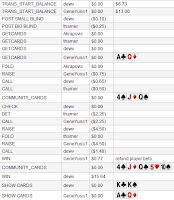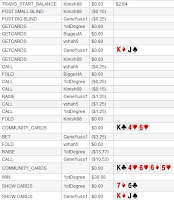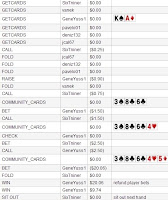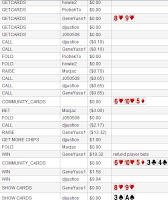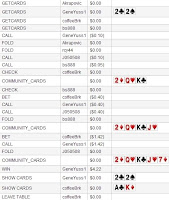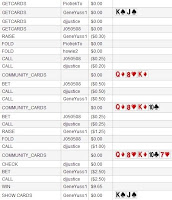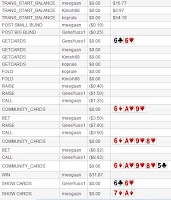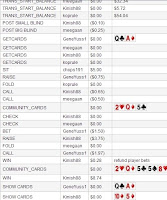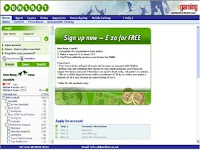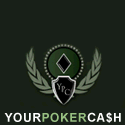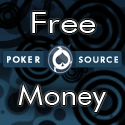
Most players know what pot odds and implied pot odds (aka implied odds) are, and how to calculate them. Just about every poker book or website has a section on the topic. Still, I often see people making mistakes in calculating implied odds - especially when playing online. Too often, implied odds are invoked as a reason for a play when "wishful thinking" would be the more accurate description of the situation.
A perfect example came up in a recent tournament on Full Tilt Poker. The table was short-handed and playing rather loose pre-flop, but tight after the flop. The blinds were getting high, and a hand developed where we got to see a showdown between a loose player who I'll call "Loosey" and a player I'll call "Impy."
Impy had no pair and only an inside straight draw on the flop, yet he called a pot-sized bet from Loosey. Impy hit his straight on the turn, but was only able to extract a small amount from his opponent and ended up checking down the river. Impy's fuzzy logic on the flop was that, although he was behind, if he hit his hand he'd get paid off at greater odds than it required to chase his four-outer. As we saw in the hand, he got part of what he wanted (the straight), but failed to extract enough from his opponent to make his call on the flop reasonable. Furthermore, Loosey was short-stacked, had top-pair with a weak kicker, and was unlikely to have paid off much more than he did.
So, what can Impy do to improve his game? Here are some guidelines for using implied odds to greater advantage:
Only Play Against Big Stacks
When two players are contesting a pot, their maximum implied odds are exactly the same: the size of the shorter stack. If you and your opponent both have large stacks relative to the blinds and antes, your implied odds are much better than if one of you is sitting on a smaller stack, simply because there are more chips that can be committed to the pot during the hand. Players who are short-stacked tend to play tighter and are less likely to try to pick off a possible bluff because they don't have any extra chips to spare, unlike a tall stack.
Don't Play Short-Handed
The more opponents there are at your table, the greater the likelihood that one or more of them will pick up a good hand, be in on the flop, and ultimately pay you off when you hit your draw. In short-handed or heads-up situations, you have to get very lucky: first you have to hit your hand, then you have to hope your opponent has a good enough hand to pay you off. My advice is, unless you have a really good read on your opponents in the hand, don't even consider implied odds unless you are at a full 9- or 10-handed table.
Play Against Tight-Aggressive Players
Implied odds are greatest against tight-aggressive players. Why? Because these are the players who are likely to have strong hands after the flop, and are likely to commit a lot of chips to defend their good hands. Tight-aggressive players are also going to be involved in smaller pots on the flop, and will check-raise more often than loose players when out of position. This gives you free-card opportunities, which improve your implied odds. Psychologically, once involved in a hand, tight players may have a harder time letting go after the flop than loose players who are always in action. Over time, those loose players are going to have a harder time finding a reason to play with you after the flop.
The key to playing against tight-aggressive players after the flop is to keep the pot as small as possible until you hit your draw. If they put a lot of pressure on you, you're better off folding your draw and waiting for a better situation. Not every hand can be played profitably after the flop.
Incorporate Bluffs and Semi-Bluffs
If you are drawing on the flop, you should be betting and raising instead of passively checking and calling to hit your hand. This gives you two ways to win by:
* Forcing your opponents to fold, or
* Hitting your draw
This is called a semi-bluff. The only time you should play passively is if you think a free card will help your situation more than getting your opponent to fold.
Another thing to remember is that you are definitely going to miss your draws more often than not. In these cases, you should sometimes be bluffing, but the question is, how much and how frequently?
Let's say the pot has $100 in it and you have $100 left, and you are deciding whether to bluff on the river. You're giving your opponent 2-1 odds to call you, which is exactly how often you should bluff in that situation (two times for every one that you don't).
How do you choose the right balance between keeping the pot small after the flop and playing aggressively as I am advocating here? That's the art, and it requires lots of practice and a good read on your opponents. You may want to pick up Sklansky's Theory of Poker to learn more about optimal bluffing frequency and semi-bluffs. By employing these techniques correctly, you can vastly increase your implied odds and positive expectation.





